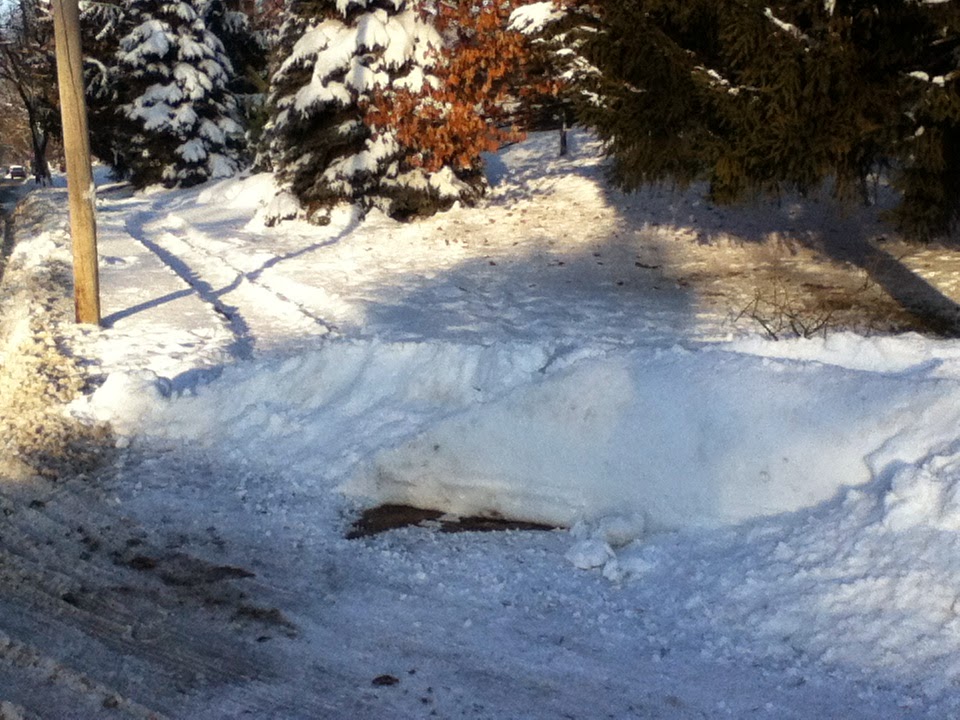 |
| Google Street View of Nesmith's childhood street crossing |
Recently, New York Times health columnist Jane E. Brody ran a two-part series on pedestrians, which got me thinking about my own habits. As I walk to and from work, or downtown, or anyplace else, I realize that my paramount consideration is: Avoid cars wherever possible. That means never crossing an intersection in front of a car if there's an alternative, even if I have the right of way. After all, the driver might not stop, and then where would I be? And if I see an opportunity to cross a street mid-block, because no cars are coming in either direction, I do it. There is even an advantage to crossing mid-block--a fact also noted by Ms. Brody, "Although I know it's wrong"--namely that cars can appear from only two places: down the street on your right, and down the street on your left. Crossing at an intersection, you potentially have to deal with turning traffic as well, which doubles the number of directions from which cars might be coming. She also crosses against a red light if there are no cars on the street she's crossing.... yup, I do that, too, again because waiting for a green light can often mean dealing with turning traffic from several directions.
| Intersection with crosswalks; swiped from U.S. Federal Highway Adm site |
Even bicycles, pedestrians' political allies in the quest for complete streets and walkable cities, are sources of danger. Many on bikes, she observes, ride as if being chased by a mad dog.... [T]he reflexes of an older person may not be quick enough to avert a run-in. Duly noted.
In her second column she discusses a number of ways that streets could be designed to favor pedestrian safety. Most of these will be familiar to anyone who's read about walkable cities: pedestrian push buttons, street trees, traffic calming, and such. One of her comments that caught my eye recommended traffic lights: Traffic lights at popular street crossings are a lot safer than stop signs, which in turn are safer than hatched lines on the street to indicate a pedestrian crosswalk. This is interesting because Cedar Rapids, under the guidance of the prophet Jeff Speck, is replacing a number of its traffic lights downtown with four-way stops. There probably are some principles at work distinguishing which intersections get which traffic controls, but when walking I'd much rather cross with a light than at a four-way stop. Even as a relatively fit 55-year-old, I can't make it across two lanes--much less four--before it's the cross-traffic's turn to go.
An important threshold for both bicyclists and pedestrians is the presence of enough of either that drivers not only notice them, but come to anticipate their presence. That's evident in the downtown areas of major cities. We're far from that in Cedar Rapids, but who knows what another generation will bring?
There's no defense against snow and ice, but a more compact city design might make managing them for pedestrian use more possible. Cedar Rapids crews did heroic work to clear the streets within hours of a major snowfall February 1, but plowed drifts still blocked sidewalks six days later.
Pardon the terrible photograph, but can you see the elderly gentleman trying to negotiate the drift with his cane?
When the parking lot is plowed, where does the snow go?
Unplowed walks are pounded into slush by walkers. When the slush re-freezes it is not only slippery but is looking for ankles to turn.
To transform our streets from exclusively auto-oriented design to routes that are safe to walk even for the elderly and the very young will be a long process. But, speaking as someone who aspires to be elderly some day, well worth the effort.
EARLIER POST: "Talking about Walking," 4 November 2013, http://brucefnesmith.blogspot.com/2013/11/talking-about-walking.html
OTHER SOURCES
Dave Alden, "Intro to Urbanism, Part Eight: Retasking Streets," Where Do We Go From Here?, 28 January 2015, http://northbaydesignkit.blogspot.com/2015/01/intro-to-urbanism-part-eight-retasking.html
Jane E. Brody,"Where Feet and Wheels Meet," New York Times, 6 January 2015, D6
Jane E. Brody, "Varied Routes to Safer Streets," New York Times, 13 January 2013, D5
Angie Schmitt, "Poll: The Hunt for the Worst Intersection in America Continues," Streetsblog USA, 31 January 2013, http://usa.streetsblog.org/2013/01/31/poll-the-hunt-for-the-worst-intersection-in-america-continues/
Jeff Speck, Walkable City: How Downtown Can Save America, One Step at a Time (New York: Farrar, Straus, Giroux, 2011)








No comments:
Post a Comment